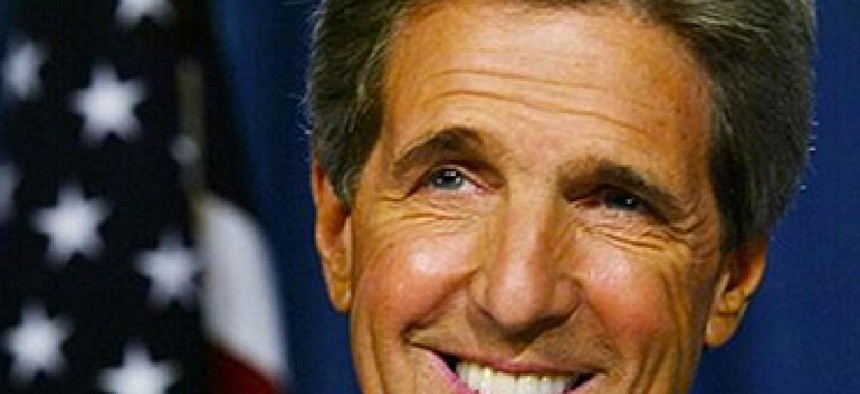Would Kerry advance e-diplomacy?

Hillary Clinton's expected successor lacks her public commitment to "21st-Century Statecraft," but experts predict he would advance the initiative.

Sen. John Kerry, likely to follow Hillary Clinton as Secretary of State, would probably continue the department's digital diplomacy efforts, according to observers. Kerry himself has stated no position.
There is broad consensus that Sen. John Kerry (D-Mass.) has the foreign policy experience to serve as Secretary of State. But what about the State Department's open-technology and digital diplomacy efforts? Does the presumed successor to Hillary Clinton have her commitment to cyber-statecraft?
As a nominee exercising discretion while awaiting his confirmation hearing, Kerry has not staked out a position on these issues, and as a senator he has focused on technology policies of a different sort. But several observers said as Secretary Kerry would likely to continue and build on the digital diplomacy efforts initiated by Clinton and her team.
"It is very unlikely we would see any shift in direction," said Rebecca MacKinnon, co-founder of Global Voices Online and a senior fellow at the New America Foundation. "It’s hard to imagine that with all the embassies having Twitter accounts and how social media is used on numerous platforms by the State Department that anything would be rolled back or changed by Kerry’s team."
"I expect Kerry to build upon the foundation that has been laid very concretely by Clinton’s team, and based on his own style and where the technology goes and what the issues are, he may take it in new directions," MacKinnon said. "We’ve seen how important it is to have a dialogue with the global public, and unless the Obama administration decided it didn’t like that policy, I don’t see how or why Kerry would reverse that."
I expect Kerry to build upon the foundation that has been laid ... by Clinton’s team. -- Rebecca MacKinnon.
The State Department has had an Office of eDiplomacy since 2003, but Clinton has made "21st Century Statecraft" a priority, jump-starting its ability to harness individuals' interconnectedness through mobile devices and social media platforms. It's a path that other nations have followed; according to a survey by the Digital Policy Council released Jan. 1, 75 percent of the world’s heads of state are on Twitter, up from 20 percent in 2010.
When reached for comment by FCW, Kerry’s Senate press secretary Alec Gerlach said the senator and his team aren’t doing any interviews yet, but it seems likely Kerry will provide continuity in existing eDiplomacy policies that sources said are close to institutionalized at this point.
"I can’t prejudge Kerry’s beliefs, but the reason I have confidence Kerry will carry forward (existing eDiplomacy initiatives) is first and foremost because the Internet is already demonstrating benefits for the United States, at least in terms of using it as a tool for public diplomacy," said Bennett Freeman, who was deputy assistant secretary of state for democracy, human rights and labor under Secretary of State Madeleine Albright during President Bill Clinton’s second term.
Freeman, now a senior vice president at Calvert Investments, worked under a transition of secretaries of state. He said Kerry has watched Hillary Clinton’s tech-centric diplomatic agenda unfold at "the perfect time" and predicted Kerry will want to continue that progress.
"What has been achieved in the last several years is not only the launch of a significant set of initiatives, but significant progress in implementing them," Freeman said. "There’s something approaching an infrastructure between public diplomacy tools in our growing role with international bodies and also in promoting the whole agenda of Internet freedom. These initiatives will continue to evolve and I think we’re in the early days of demonstrating and discovering, but the benefits are there, and I think Kerry is as experienced and smart as they come and he’ll recognize that."
Kerry has said little about digital statecraft directly, but has pushed for both online privacy and innovation as chairman of the Commerce Committee's Communications, Technology, and the Internet Subcommittee. And he has spoken on the record in the past about cyber-security concerns, once proposing the United States appoint an ambassador for cyberspace, which speaks well of his grasp of the subject, said Parag Khanna, director of the Hybrid Reality Institute and author of the book "How to Run the World."
"I view him to be a very tech-savvy leader who would very much sustain and likely make more broad-reaching and strategic the various e-initiatives begun under Hilary Clinton," Khanna told FCW via e-mail. "Furthermore, I think Kerry has a firm grasp of the cyber-security threat and would make this a higher-level issue in bilateral and regional diplomacy."
And Kerry has made his own forays into social media, dating back at least to his 2004 presidential bid.
The long-time senator uses his personal Twitter account to inform his 56,000 followers on legislation and is known to engage some users personally. He utilizes his Facebook page in similar fashion, uploading pictures and content regularly for the 20,000 or so followers of his page.
The website Mashable went so far as to call him "socially savvy," saying: "Kerry's no Cory Booker or Chuck Grassley: He can go days without tweeting and he shows plenty of the usual political Twitter behavior, such as tweeting about bills he backs and thanking supporters. But there's plenty of personality there, too."
Yet while Kerry -- and U.S. embassies and ambassadors -- may be embracing the Twitterverse, the State Department’s e-diplomacy efforts stretch past traditional websites and simply harnessing social media.
Diplopedia, for example -- the State Department's internal knowledge-sharing, which nearly 18,000 articles created and used by department employees -- was used in 2010 to help coordinate crisis management in the aftermath of the Haiti earthquake. And the department’s TechCamp program has provided more than 1,100 civil society organizations from 81 countries with the resources and capabilities of the tech community since Clinton’s Civil Society 2.0 initiative created it in 2010.
Noel Dickover, senior new media advisor for the State Department’s Office of eDiplomacy, told FCW in a prior interview that each TechCamp produces a rise in digital literacy among participants, who benefit themselves and their communities through the implementation of low-cost technology they discover at the events.
"It really is a whole new look at foreign policy," Freeman said. "I remember how little we understood the emergence of the Internet as a tool for public diplomacy, and I think it really took until the second Bush administration to get the whole picture."
Clinton, Freeman said, got the ball rolling, and it will be up to Kerry to "consolidate and collaborate" on digital diplomacy – a task for which he believes Kerry will be ready.



